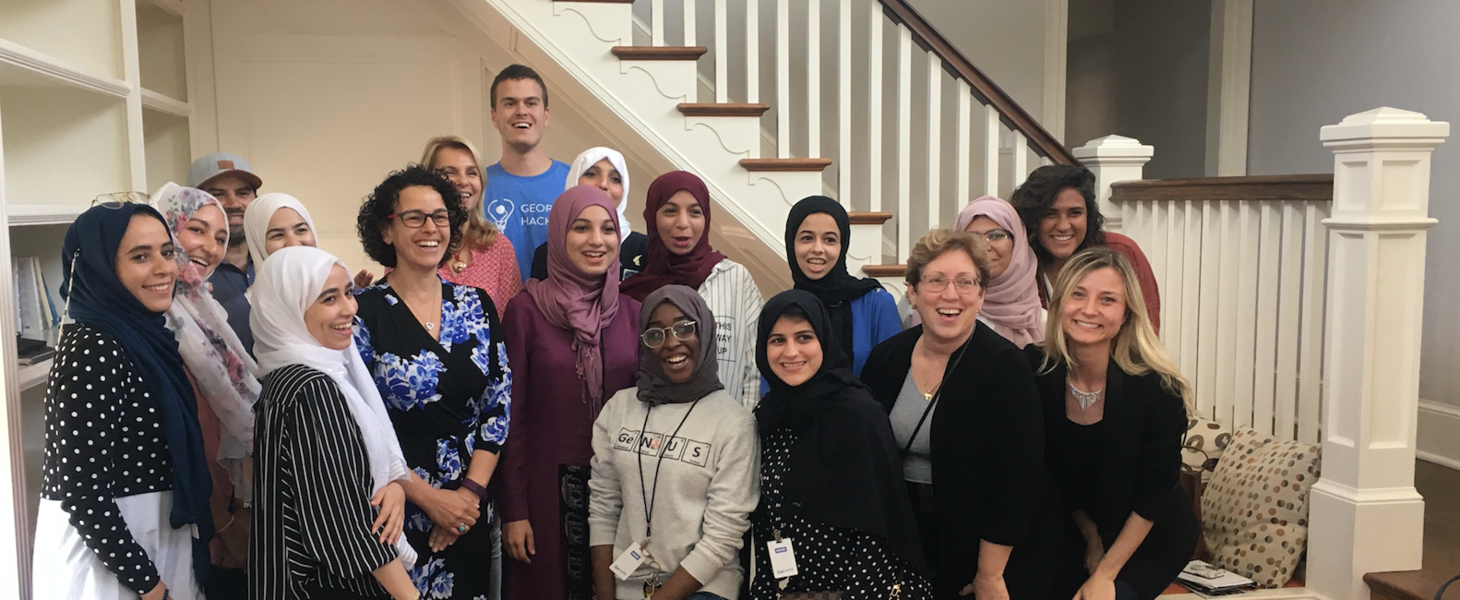
11 Aug Three Innovation Insights for MENA Entrepreneurs
This summer, I had two opportunities to share entrepreneurial wisdom and learn about the opportunities and challenges on the mind of entrepreneurs from the Middle East and North Africa (MENA).
In July, I served on a panel at the DC Lugar Center, organized by the Indiana University Kelley School of Business Institute of International Business. I had the pleasure to reconnect with former colleagues, including Christine Everett, Susan Loucks, and Tim Smith, as well as connect with the new cohort of Global Business Institute Fellows. From Algeria, Egypt, Jordan, Morocco, Pakistan, Palestine, Saudi Arabia, and Tunisia, these emerging social innovators participated in an accelerated 3.5-week curriculum based on the core elements of the Kelley School of Business undergraduate program (including Accounting, Communications and Presentation Skills, Economics, Entrepreneurship, Finance, Human Resources, Marketing, Operations, and Law and Ethics). In addition, the Fellows came to DC to engage in a series of panels and site visits to introduce them to the wide variety of entrepreneurial venture opportunities in the area. As an Board Member for the IU Kelley Johnson Center for Entrepreneurship and Corporate Innovation, I am always in to help build bridges for Kelley students to learn more about entrepreneurial opportunities on the East Coast. As a panelist, I shared insights about innovating in highly regulated industries including higher education, as well as a bit about my story as a Moroccan/Swiss and naturalized American female STEM PhD turned entrepreneur.
In August, I was honored to be invited by Springboard Enterprises to participate in a roundtable for women entrepreneurs from the 2018 Saudi Arabia-Halcyon Incubator Intensive. These 14 remarkable women are building businesses in a number of industries, from education to virtual reality to healthcare. I had the pleasure to participate in a conversation facilitated by Amy Millman, CEO of Springboard Enterprises, and attended by Annamaria Konya Tannon, Chief Evangelist for Innovation, Entrepreneurship, and Invention for the George Washington University School of Engineering and Applied Science.
It was an amazing experience to connect with emerging leaders from the MENA region at both the Kelley panel and the Springboard Entreprises/Halcyon roundtable. These rich conversations included many valuable insights and reminders I will keep using as I continue on my entrepreneurial journey. See below three insights and resources I hope will help emerging and established innovators and entrepreneurs in the MENA region as they build and grow their business or mission-driven venture!
Insight #1 – Go from Features to Benefits
Our brain is wired with a strong bias for confirmation, especially when we feel we are an expert in an industry or discipline. As entrepreneurs, we tend to have strong opinions about what clients need and what they should be satisfied with in terms of services and products to meet their needs. That is one of the most humbling experiences for all entrepreneurs: it does not matter what we feel clients needs, what matters is to be open to listen to our clients so they can tell us about their pain points, what they are willing to buy to address that pain point, how often and for how much. It does not matter that all latest innovation has the best features in the industry. If clients don’t value these features as offering tangible benefit to address their pain points (i.e. it’s better, faster, cheaper than what I’m doing now to solve this issue), chances are our business is not going to be as successful as it could be.
Remaining in a listening and learning mode is even harder when we invested a lot of time and energy in building a specific product and service. This is why before investing in building something, it is critical to invest in good customer discovery. I highly recommend Steve Blank’s How to Build a Startup on Udacity to learn how to categorize customers, how to conduct customer interviews, and how to make informed decisions about your product market fit. I also recommend Clayton Christensen’s Jobs to be Done framework on building products that people will want to use.
Insight #2 – Cultivate your Connections
To succeed, entrepreneurs need connections as much as they need capital. Global innovation networks such as Net Impact, HeraHub, ImpactHub and 1776 have been transformational in my ability to gain access to mentors and a supportive community of entrepreneurs and innovators over the years. I’m a huge fan of the Dolphin Tanks by Springboard Enterprises, which are pitch evenings where founders receive validation, new ideas, as well as connections to bring their business to the next level. I also recommend looking into movements such as Black Female Founders (#BFF), the Social Venture Network (SVN), the Mentor Capital Network, Echoing Green, the Hult Prize, the Inclusive Innovation Incubator(In3DC), All Raise, the PeaceTech Accelerator, Seed Spot, Ashoka, the Omidyar Network, and Pipeline Angels. I follow these entities on social media, read their entrepreneurs’ stories as a source of solace, encouragement or information, as well as attend their events to pay it forward when I can.
Insight #3 – Lead with Agile Grit
Accumulating evidence, beautifully summarized by Caroline Miller as well as Angela Duckworth show that grit is like a muscle. The more we learn to persist, the more resilient we become in the face of adversity. So, you might ask, we can become more competent and confident in our ability to persist when we face challenges? That’s great to hear…
But that does not address what is probably one of the most difficult aspects of entrepreneurship to me: when do you know that you need to persist versus when you need to switch to a new strategy or a new venture all together? The unique ability to remain agile yet gritty is at the core of entrepreneurial success. Eric Ries is one of the most influential contributors to the art of the entrepreneurial pivot. I highly recommend reading his case studies and also recommend his contributions to the a16z Podcast: Startups, Pivots, Culture, and Timing to learn more about key factors to strategize and implement a successful entrepreneurial pivot.
I hope these thoughts and resources will be of help to the amazing emerging entrepreneurs I’ve had the pleasure to meet this summer. I look forward to future updates and wish you all the best with your future endeavors!


